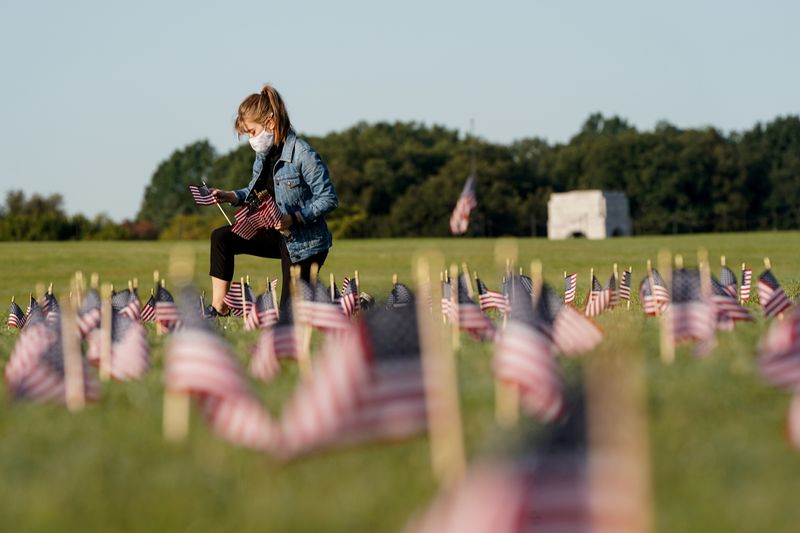By Tom Hals
(Reuters) - U.S. businesses with COVID-19 outbreaks are facing an emerging legal threat from claims that workers brought coronavirus home and infected relatives, which one risk analysis firm said could cost employers billions of dollars.
The daughter of Esperanza Ugalde of Illinois filed in August what lawyers believe is the first wrongful death "take home" lawsuit, alleging her mother died of COVID-19 that her father contracted at Aurora Packing Co's meat processing plant.
The cases borrow elements from "take home" asbestos litigation and avoid caps on liability for workplace injuries, exposing business to costly pain and suffering damages, even though the plaintiff never set foot on their premises.
"Businesses should be very concerned about these cases," said labor and employment attorney Tom Gies of Crowell & Moring, which defends employers.
The lawsuit against Aurora alleges that Ricardo Ugalde worked "shoulder to shoulder" on the company's processing line in April when Aurora knew it had a coronavirus outbreak at its facility and failed to warn employees or adopt any infection prevention measures.
Aurora did not respond to a request for comment.
Between 7% and 9% of the roughly 200,000 U.S. COVID-19 deaths so far are believed to stem from take-home infections and the lawsuits could cost businesses up to $21 billion if the number of Americans fatalities reaches 300,000, according to Praedicat, a firm that evaluates risks for insurers.
Rob Reville, Praedicat's chief executive, cautions that is a worst-case scenario and said the cases might cost far less, depending on how judges view the lawsuits.
The U.S. workers compensation system generally makes it difficult for workers to sue for COVID-19. The system caps liability for businesses and bars costly lawsuits in return for quick payments to employees, who do not need to prove fault.
But Esperanza Ugalde was not an employee of Aurora, so her family can sue the company. Depending on the circumstances, a successful wrongful death case can top $1 million in damages.
Take-home cases have been around for decades in asbestos litigation and courts have split on whether a business has an obligation to members of the public who have never been on their premises.
In 2013, a California jury awarded Rose-Marie Griggs $27.3 million in compensatory and punitive damages after she contracted mesothelioma that her lawyers argued was caused by asbestos fibers carried home in the 1950s on the work clothes of her then-husband, who installed insulation for an affiliate of Owens-Illinios Inc.
The company appealed and two sides reached a private settlement before the appeal was heard.
CONTESTING THE 'CAUSAL CHAIN'
Attorneys for both plaintiffs and companies said successful cases require a strong "causal chain" linking the sick family member to the worker and then to the business and the business's alleged failure to adopt safety measures.
Miriam Alvarez Reynoso sued Byrne & Schaefer Inc, a manufacturer of electrical components in Lockport, Illinois, alleging negligence by the company led to her contracting COVID-19 and suffering "serious injuries to multiple organs."
Reynoso's lawsuit says she became infected while caring for her husband Servando Reynoso, a parts assembler at the company, who came home sick from work on April 8. It lists 18 categories of alleged shortcomings by Byrne & Schaefer, including failing to clean work areas and ignoring employees who said they had COVID-19 symptoms.
Company owner Tim Byrne said his five employees wore masks routinely before the pandemic to protect against dust and regularly used gloves.
"He was sick before anyone else," said Byrne. "It's difficult to prove after the fact."
Lawyers said employers would likely be reluctant to settle the cases for significant sums until claims were vetted in the court system.
Peter Wozniak, an attorney with Barnes & Thornburg who represents employers, said the cases will test juror attitudes toward the behavior of plaintiffs, who need to show they protected themselves from other sources of infection.
"Are you always wearing a mask? Are you staying six feet away? Are you washing your hands," he said. "It will be interesting and unpredictable with regards to people's attitudes for individual responsibility."

The best protection for business owners will be adopting and documenting measures to protect workers.
"If they had acted reasonably and if Aurora put these things in place prior to the death of Esperanza I don't know if I would have taken the case," said Bridget Duignan, who represents Ugalde's daughter.
"But they did nothing."